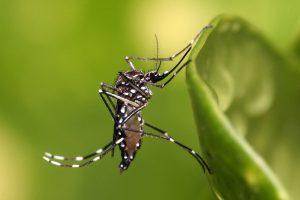West Nile virus has been identified in a pool (group) of mosquitoes collected in Grand Forks. Although favorable test rates for the virus remain low, residents are encouraged to take extra precautions to avoid being bitten by mosquitoes.
The mosquito most common for transmitting West Nile virus is the Culex tarsalis. This mosquito is most active in the few hours after sunset. To help reduce your risk of getting West Nile virus, the following protective measures are recommended:
- Use insect repellent that contains DEET.
- Limit outdoor activities between dusk and dawn when mosquitoes are most active.
- Wear long pants and long-sleeved shirts when possible.
- Eliminate standing water around homes (e.g., buckets, flowerpots, old tires, wading pools, and birdbaths).
Grand Forks Mosquito Control operates as if the virus is always present; therefore, significant changes to the daily operations of mosquito control are not to be expected.
Mosquitoes generally transmit the West Nile virus. When a mosquito feeds on an infected bird, it can pick up the virus and transmit it to other noninfected birds. Occasionally, infective mosquitoes feed on mammals, including humans, and transmit the virus.
Most people infected with West Nile virus do not develop symptoms, however, some may develop mild illness one to two weeks after exposure with symptoms such as fever, headache, body aches, skin rash and swollen lymph nodes. Less than one percent of infected people may develop a severe illness, including encephalitis (brain inflammation). These persons might experience headaches, high fever, neck stiffness, disorientation, convulsions, and muscle weakness. Infection may prove fatal in a small number of those who develop encephalitis, especially among older individuals. West Nile virus is not transmitted directly from birds to humans.
If you think you or a family member might have West Nile virus disease, speak with your healthcare provider.
For more information about the West Nile virus and the Grand Forks Mosquito Control Program, visit gfmosquito.com





